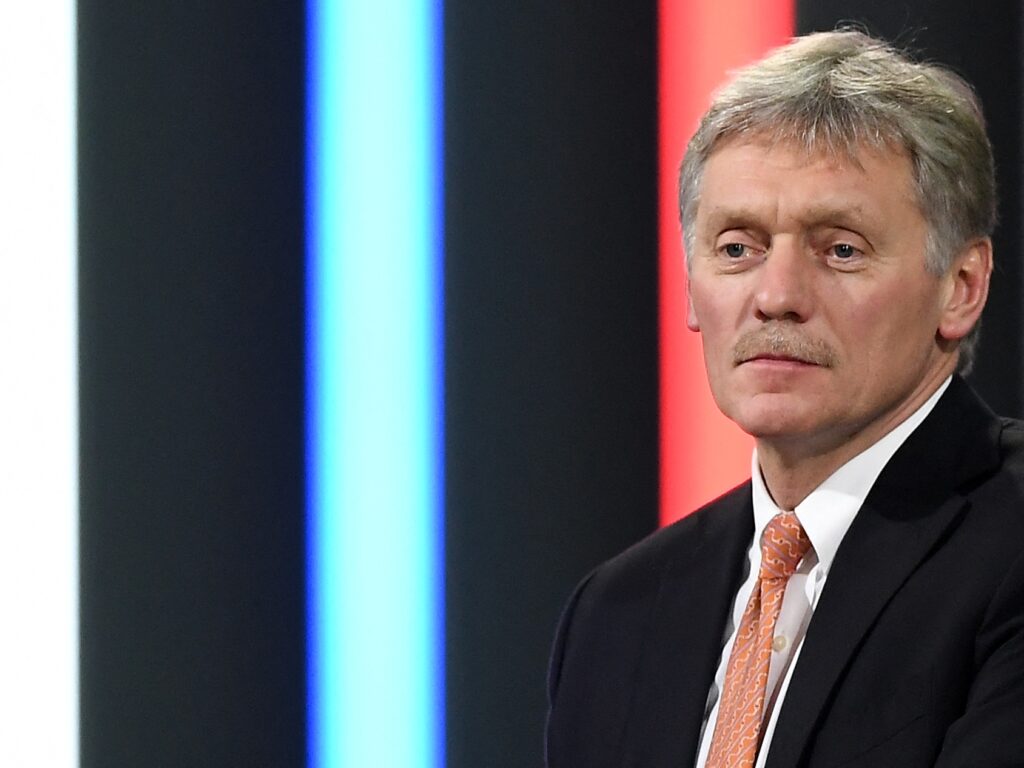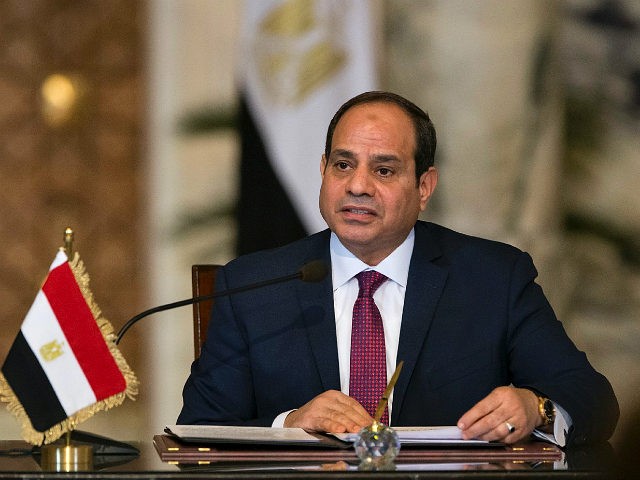A senior Egyptian official on Tuesday said that information in allegedly leaked Pentagon documents showing Egypt was preparing to send 40,000 rockets to Russia was fake.
Egypt is the seventh country to challenge the authenticity of the alleged Pentagon leak, following Ukraine, Russia, South Korea, Serbia, the United Kingdom, and the United Arab Emirates (UAE).
The documents were leaked in February by parties unknown, for purposes unknown, through methods unknown. According to the Associated Press, the earliest known appearance of the documents was on a voice, video, and text chat platform called Discord commonly used by video game players. An anonymous poster to a forum debate about the war in Ukraine began uploading scanned images of the papers, which were then passed between Discord users until the media became aware of them last week.
None of the classified documents has been authenticated by U.S. officials to date, and some of them appear to have been digitally altered. Many of the documents purportedly reveal information collected on allies and adversaries by American intelligence services.
The Pentagon on Monday described the alleged leak as a “very serious risk to national security,” but did not confirm if any of the documents were genuine, or offer any theories as to who purloined them, or why.
The Washington Post reported Tuesday that one of the documents, dated February 17, “summarizes purported conversations between [Egyptian President Abdel Fattah el-Sisi] and senior Egyptian military officials and also references plans to supply Russia with artillery rounds and gunpowder.”
An unnamed Egyptian official quoted by state media on Tuesday called the Washington Post story “informational absurdity.” Egyptian officials speaking on the record have either refused to comment on the story, or reiterated Egypt’s opposition to the Russian invasion of Ukraine.
Kremlin spokesman Dmitry Peskov dismissed the Washington Post story as a “hoax” on Tuesday.

Kremlin spokesman Dmitry Peskov moderates Russian President Vladimir Putin’s annual press conference at the Manezh exhibition hall in central Moscow on December 23, 2021. (NATALIA KOLESNIKOVA/AFP via Getty Images)
The conversation the Washington Post alleged to have been documented in the leaks supposedly included Sisi giving detailed instructions to keep the shipment of roughly 40,000 rockets secret “to avoid problems with the West.” Gunpowder would be produced at an elderly chemical plant, and workers would be told they were producing munitions for the Egyptian army.
A person identified as “Salah al-Din” in the transcript, who is evidently the owner or manager of a munitions plant, replied that he would order his people to work extra shifts to produce the rockets because he felt Egypt needed to repay Russia for some unspecified assistance rendered by the Russians.
The Washington Post floated several theories for what this Russian favor might have been, including deals to build a railroad workshop and a nuclear power plant in Egypt, or perhaps heavy shipments of Russian grain to Egypt after the invasion of Ukraine cut off Egypt’s usual supply.

In this file photo taken on August 12, 2014, Russian President Vladimir Putin, left, and Egyptian President Abdel Fattah el-Sisi, visit missile cruiser Moskva (Moscow) in the Russian Black Sea resort of Sochi, Russia. (Alexei Druzhinin, Sputnik, Kremlin Pool Photo via AP, file)
The alleged transcript quoted Sisi implying that the rockets sold to Russia would be Sakr-45s, a model compatible with Russia’s Grad launchers. “Salah al-Din” told Sisi the Russians were desperate for ammunition and would “buy anything.”
The Washington Post noted that if the leaked document is genuine and the date is correct, Sisi would have held this conversation about supplying weapons to Russia only a few days after U.S. Secretary of State Antony Blinken visited Cairo. Egypt dispatched its own foreign minister to Moscow as soon as Blinken left, as part of Egypt’s delicate balancing act between Washington and Moscow.
Human rights advocates and military analysts told the Washington Post it was not implausible for Sisi to be leaning more toward Moscow at the moment, as he grows weary of Western pressure over human rights violations — including $130 million held back from Egypt’s annual security aid package by the Biden administration in September — and worries about economic disruptions from the Ukraine war increasing unrest in Egypt.
On the other hand, skeptical observers doubted Sisi would be willing to destroy Egypt’s relationship with the United States, and lose over a billion dollars in aid every year, simply to rush a shipment of rockets to Russia.
The White House gave Egypt plenty of space for deniability by stating on Tuesday that it sees “no indication Egypt is providing lethal weapons capabilities to Russia” and praising Egypt as a “significant security partner.”
Also on Tuesday, the Associated Press (AP) reviewed a document from the alleged leak that described Russian intelligence officers claiming to have recruited the United Arab Emirates to “work together against the U.S. and UK intelligence agencies.”
Emirati officials immediately dismissed the AP story as “categorically false.”
“We refute any allegation regarding an agreement to deepen cooperation between the UAE and other countries’ security services against another country,” the Emirati statement said.
“The UAE has deep and distinguished relations with all countries, reflecting its principles of openness, partnership, building bridges, and working to serve the common interests of countries and peoples to achieve international peace and security,” the statement added.
Some analysts speculated that even if the leaked document is genuine, the Russia intelligence officers quoted in the transcript might have been exaggerating or deliberately lying about the level of cooperation between Russia and the UAE.
The AP, however, noted there has been growing concern in the Biden administration over the UAE growing closer to Moscow – including a public complaint by Assistant Treasury Secretary Elizabeth Rosenberg on March 2 that the Emiratis are helping Russia evade sanctions.
Other U.S. officials have suggested the UAE is quietly funding the Wagner Group, the notorious Russian mercenary organization founded by Yevgeny Prighozhin, a close ally of Russian leader Vladimir Putin.
The UAE ostensibly put money into Wagner because it wants to use the mercenary organization as a proxy force in Libya, and possibly other regional conflicts the Emiratis view as securing concerns. The UAE vehemently denied having any involvement with the Wagner Group in late 2022.
Before Egypt and the UAE on Tuesday, the UK said there was a “serious level of inaccuracy” in documents that allegedly showed a large contingent of British special forces troops operating in Ukraine.
South Korea challenged the authenticity of documents that claimed two former security officials were reluctant to grant a U.S. request to buy artillery shells because they feared the munitions might be sent to the Ukrainians.
Serbian Defense Minister Milos Vucevic said on Wednesday that documents claiming his country agreed to supply the Ukrainian military with weapons are “untrue.” Like Egypt, Serbia is attempting to maintain relations with both Russia and the West, in this case the European Union, which Serbia has aspirations to join.
Russia, as noted above, has dismissed some of the leaked papers as fakes, and Ukraine has challenged the accuracy of documents that supposedly provided a gloomy assessment of Kyiv’s ability to win the war against Russia.
“There is a lot of information there which does not correspond with reality. The information which does correspond with reality has lost its relevance. So it’s a mix of truth and falsehoods,” Ukrainian Defense Minister Oleksii Reznikov said on Wednesday.

COMMENTS
Please let us know if you're having issues with commenting.